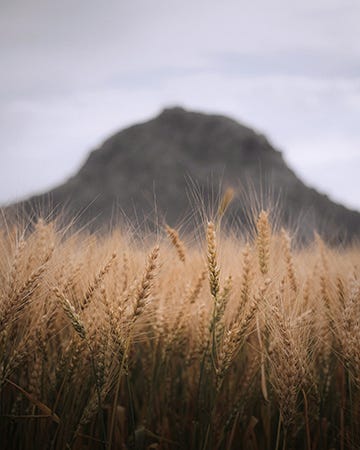What does contentment mean to you? I always thought it was a feeling you enjoyed only after all the pieces of life seemed to line up “just so.” You’d finally relax with a sigh of relief and soak in the moment before all too quickly it evaporated like morning mist and reality settled in once again.
And so most of our life, then, is spent working to make things line up “just right” with the goal of experiencing that wonderful feeling of contentment—if only just one minute more. When you look at it that way, there’s more frustration and disappointment built into that arrangement than there is hope and rest.
A Very Different Definition
A year or so ago I attended a Sunday school class on Christian contentment. It not only expanded my understanding of what contentment means, it also left me with many questions to ask myself regarding my own contentment.
If you know me, then you know I’m generally a happy, optimistic person, but after this class, I wasn’t sure how much my happiness translated to contentment with God on a consistent basis. And that really troubled me.
The teacher based his class on the writing of a 17th century Puritan pastor named Jeremiah Burroughs who wrote The Rare Jewel of Christian Contentment. And the framework for his class was based on how Burroughs defines Christian contentment:
“…a pleasant, internal, peaceful, and gracious state of mind, which freely submits to and delights in God’s wise and fatherly decisions in every condition.”
It didn’t take a lot of self-reflecting to understand that I did not often delight in God’s every decision. When I began working on what was preventing me from doing so, God revealed to me a pretty bad case of pride.
And one of the first times I really began to understand my pride was this past spring.
Iron sharpens Iron
This past spring, a friend lent me a book about laying aside pride and finding true rest in the Lord.
We had gotten together for our Lenten Prayer group, but providentially, she and I were the only two to show up!
It gave me an opportunity to apologize for how emotional I had become the day before when our small group1 discussed Psalm 16. I had not expected to be overcome with emotion, but it came because I was sharing something the Lord had revealed to me and, I felt ashamed.
While I studied Psalm 16, there were two verses that God had seemed to highlight for me.
In verses 5 and 6, David writes, “Lord, you have assigned me my portion and my cup; You have made my lot secure. The boundary lines have fallen for me in pleasant places; surely, I have a delightful inheritance.”
I couldn’t stop thinking about these verses. Why had God made them stand out to me? What did He want me to learn?
How I came to understand these verses is this: The Lord has assigned to me the days of my life. He has ordained plans for me, and work for me to do. And inside those days, and plans, and work, He has given me boundaries— limitations— I have to recognize and live within.
David calls these boundaries “pleasant places.” Paul, too, said he had learned to be content in whatever circumstances God had placed him.2 Both Paul and David glorified God by calling their God ordained boundary lines pleasant.
After a few days of meditating on these verses, I asked myself the question I was afraid to answer:
Am I content with the boundaries God has given me?
The tears spilled over because I knew in my heart the answer was no.
So, my friend lent me her wonderful book called Humble Roots, and while the entire book taught me much about the many faces of pride and how it robs us of rest, one line in particular punched me in the gut.
“You may never achieve financial stability.”3
She had written this sentence in the middle of a list of desires we may have that never happen, but this one was written in bold with flashing lights. (At least that’s how my eyes saw it!)
Our Financial Instability
Soon after Rich and I got married, he incorporated his own small business, and I learned how to manage the books. And let me tell you, I had taught high school English. The learning curve between English and math was steep for me!
Richard does contract work with utility companies. He works all over the country helping power plant crews align their steam turbines during maintenance shutdowns. Rich works in seasons—mainly fall and spring—and gets paid by the job. Jobs can take anywhere between 30-90 days to pay—sometimes longer. What he earns in one season needs to last us until a month or two into the next work season.
When we first started this 17 years ago, we were horrible at managing our finances. We were living well beyond our means, using credit and loans to get by once the money ran out.4 A vicious cycle that repeated over and over each year.
God gave us a serious wakeup call about 10 years ago, and we have since learned to live on a budget—one for the company and one for us personally. We’ve learned to live within our means, and we’ve learned to tell ourselves no. We’ve learned to sacrifice, and we’ve learned to save.
But Rich’s work is never guaranteed. We never know how many jobs he’ll have or what he’ll earn each fall or spring. Sometimes there’s feast; sometimes there’s famine. Every six months, we have to re-evaluate and often rewrite our budget.
It can be scary when his schedule looks weak and not very promising. But these are also the seasons that draw us closer to the Lord. We cling to Him as we preach remembrance to each other.
Charles Spurgeon tells us to “Light up the lamps of the past!” So we remind ourselves and each other of all the times God has provided in the past. Of His faithfulness. How He has never abandoned us and is worthy of our trust.
Working two seasons each year, we’re now in our 34th season of this work, and the hard lessons and the diligence and the effort of keeping the budget has been worthwhile, but it is also wearisome.
I always had it in my head that one day, we would not have to fret over the unknown work season.
If I just worked hard enough, remained disciplined and careful, and crunched enough numbers—one day we’d be financially secure.
New Lessons to Learn
And then I read that sentence in Humble Roots, and it absolutely threw me into a tailspin.
I fought hard against believing that she could be right, that perhaps we never would be financially secure.
I was fighting so hard because I had been working so hard.
You see, I had learned to trust God to provide the work, but I was still relying on myself to determine the outcome. In that same chapter, Hannah Anderson writes, “Pride tells us that all we have to do is organize well enough, plan effectively enough, and work hard enough and we can achieve our dreams. Humility teaches us that it was never up to us in the first place.”5
And this is why I believe God highlighted those verses of Psalm 16 for me. Because it’s God who provides the work, and it’s also God who provides the security.
He has assigned me my portion and my cup; and He has made my lot secure. And yes, I can now also say: He has placed me where the boundary lines fall in pleasant places.
He gives us resources and we must prayerfully use and steward those resources, but I know it’s not up to me to create security. He is the one who produces the results. And that is a huge burden off my shoulders.
Just like we give our children boundaries for their wellbeing, the Lord lovingly provides me with boundaries, too. I can’t do it all, and I’m not meant to. When I acknowledge my limits, I draw closer to the One who is limitless.
If every next season for the remainder of my life contains unknowns and what-ifs, I can rest in what I know to be certain of God:
He is faithful and wise, gracious and kind. He gives us seeds and we plant them; but He’s the one who makes them grow. He brings the wheat to maturity. He is Lord of the Harvest6.
Bible Study Photo by Priscilla Du Preez 🇨🇦 on Unsplash
Philippians 4:11
Anderson, Hannah. Humble Roots. (Moody Publishers, 2016) p. 165
Last Coin Photo by Josh Appel on Unsplash
Anderson, Hannah. Humble Roots. p. 165
Harvest Photo by Muhammad Irfan Baloch on Unsplash







A wonderful read and reminder, Vanessa! 💗
Yes, yes, yes. Thank you for being vulnerable. It’s amazing how we are secure in God even when our perceived anchors wash away or we suddenly open our eyes and realize they weren’t tethered in the first place. I think we might always be adrift if we’re looking to something or someone that’s not God. This will certainly be a lifelong battle for me (that waxes and wanes) but one that’s worth fighting and through which we can undoubtedly draw near to God and learn how pleasant his provision truly is when we rest in our God-given boundaries and limitations.